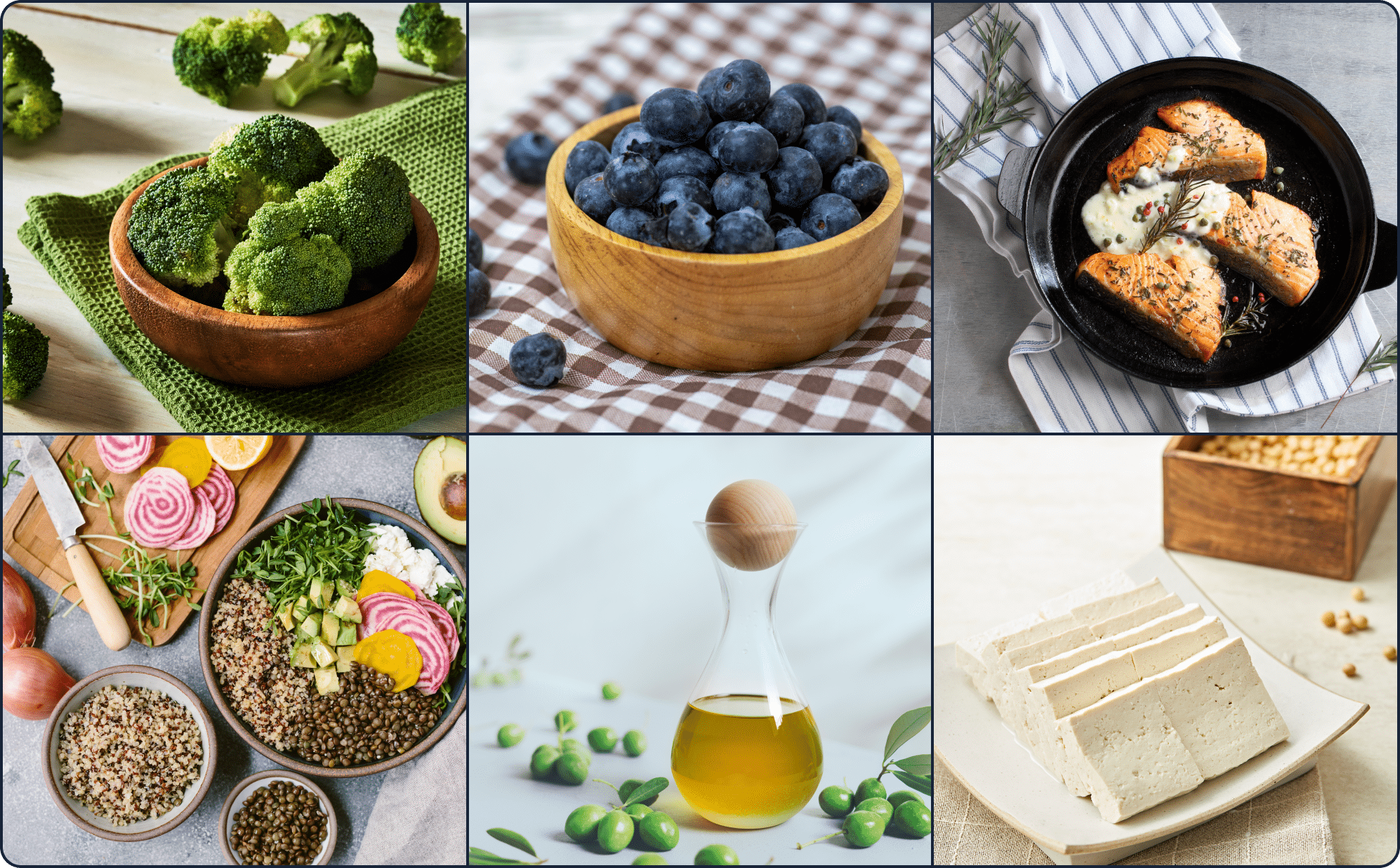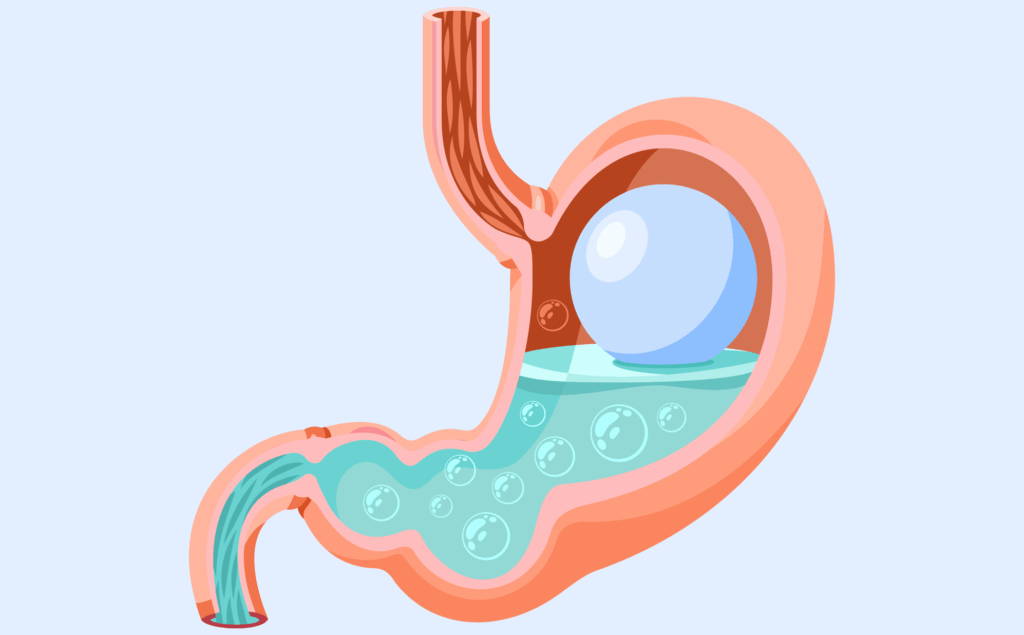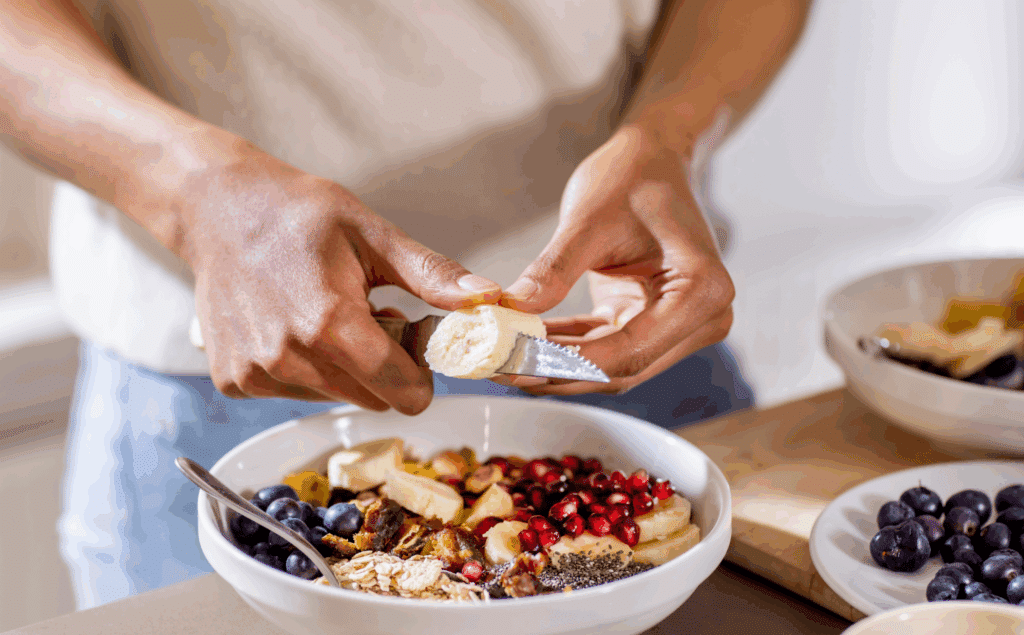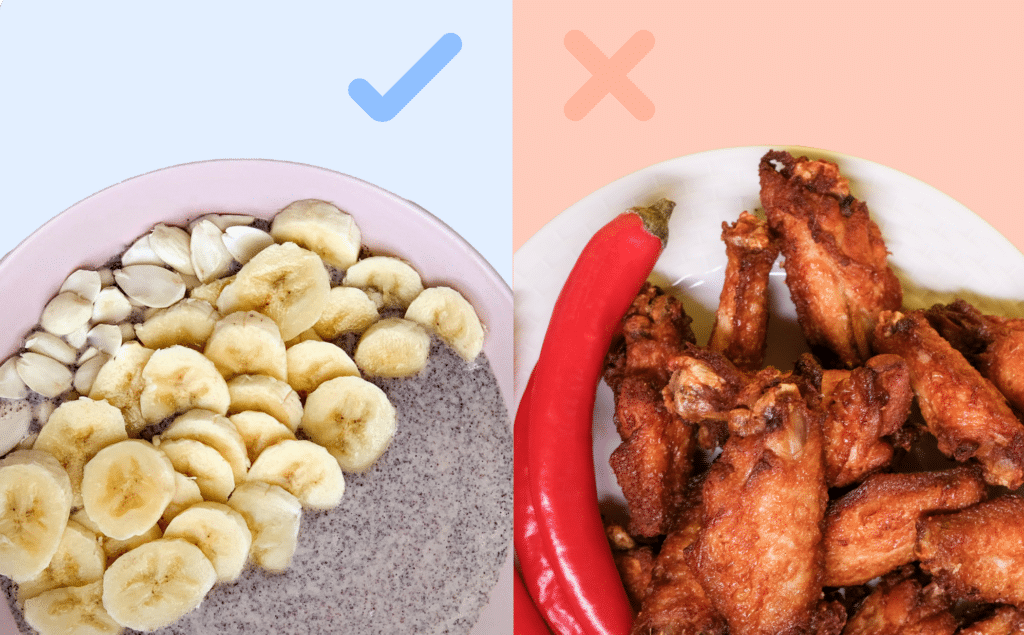If you’ve got gastroesophageal reflux disease (aka GERD), being mindful of your diet can help prevent uncomfortable symptoms and promote a healthy gastrointestinal (GI) tract. A GI registered dietitian can help you develop a GERD diet plan that’s customized to your unique needs.
Gastroesophageal reflux disease, commonly called GERD, can impact your quality of life. You might receive this diagnosis if you have frequent bouts of acid reflux. Symptoms can strike at the most inconvenient moments: when you’re trying to sleep, work out, concentrate on work, or just have fun.
If you’re like me and count yourself among the 20% of the population who has GERD, you are likely aware that diet often plays a role in either triggering or alleviating acid reflux.
But the tricky thing is that no two people with GERD have the same dietary triggers. Thankfully, through various studies, researchers have determined which foods commonly cause GERD symptoms and those which tend to keep the GI tract a little happier.
The foods listed in this article are research-backed, but you may still need a customized diet plan for managing GERD or finding acid reflux remedies. Working with a GI (gastrointestinal) specialist or a GI registered dietitian can help set you up for successful treatment. They’ll consider your specific symptoms, lifestyle, diet, any current medications, and other factors unique to you.
Understanding GERD
Before diving into specific GERD-safe foods, understanding the terminology surrounding GERD can be useful. As mentioned above, GERD is a chronic gastrointestinal condition characterized by frequent bouts of acid reflux, in which the contents of your stomach backflow into your esophagus, aka your “food pipe.” Acid reflux can in turn cause heartburn—a burning sensation in the chest or throat—as a symptom. Think of this way: Anyone can experience the occasional bout of acid reflux. Acid reflux may—or may not—include the sensation of heartburn. GERD, however, is the chronic form of acid reflux.
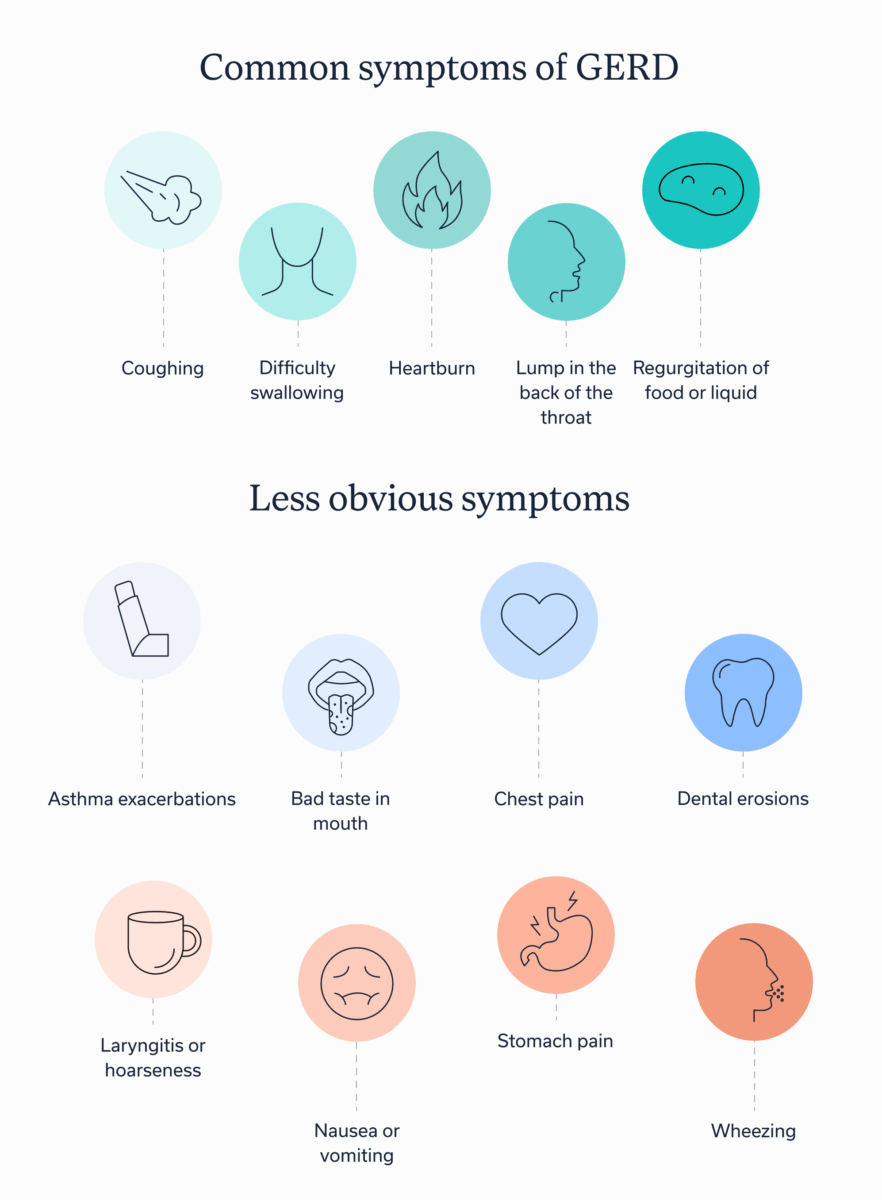
What causes acid reflux or GERD? Think of the various components of your GI tract as students responsible for various parts of a group project—moving food and drink on through, digesting it, and eliminating waste. Remember those group assignments in school? Sometimes you got paired with a slacker student who didn’t quite hold up their end of the work. In the case of acid reflux or GERD, that slacker student is the lower esophageal sphincter.
The lower esophageal sphincter is a valve separating your esophagus from your stomach. It is supposed to manage the downward flow of food and drink through your upper GI tract. Acid reflux serves as a signal that the valve isn’t doing its job properly. Your stomach’s contents include acid, so reflux can irritate your esophageal lining, leading to the characteristically uncomfortable symptoms.
Common symptoms of GERD, from most common to least common:
-
Heartburn
-
Lump in the back of the throat
-
Difficulty swallowing
-
Coughing
-
Regurgitation of food or liquid
Less obvious symptoms
-
Asthma exacerbations
-
Bad taste in mouth
-
Chest pain
-
Dental erosions
-
Laryngitis or hoarseness
-
Nausea or vomiting
-
Stomach pain
-
Wheezing
Why dietary modification matters for GERD
Diet serves as a key way to help manage GERD and keep symptoms at bay. Working with a registered dietitian or GI provider can help you determine which foods are GERD-safe for you and create a management plan, which may include dietary modifications as well as medications or any other necessary treatments.
Top GERD-safe foods to incorporate into your diet
As noted earlier, your GERD-safe foods will likely be different from the next person’s. That’s why a customized approach to managing GERD with diet is best. But here are a few to consider based on research and the recommendations of Oshi Health GI registered dietitians.
High-fiber vegetables
High-fiber foods may aid with digestive motility, or movement. Improved motility helps to reduce the pressure on the esophageal sphincter and lessen some symptoms.
GERD-friendly veggies
-
Asparagus
-
Broccoli
-
Brussels sprouts
-
Carrots
-
Cauliflower
-
Celery
-
Cucumber
-
Fennel
-
Green beans
-
Lettuce
-
Peas
-
Potatoes (not fried)
-
Sweet potatoes
-
Squash
-
Zucchini
Non-citrus fruits
Fruits also help up your fiber intake and provide vitamins and minerals to support overall nutrition. Non-citrus fruits are generally GERD-friendly, except for tomatoes.
GERD-friendly fruits
-
Apples
-
Avocados
-
Bananas
-
Berries
-
Pears
-
Melons
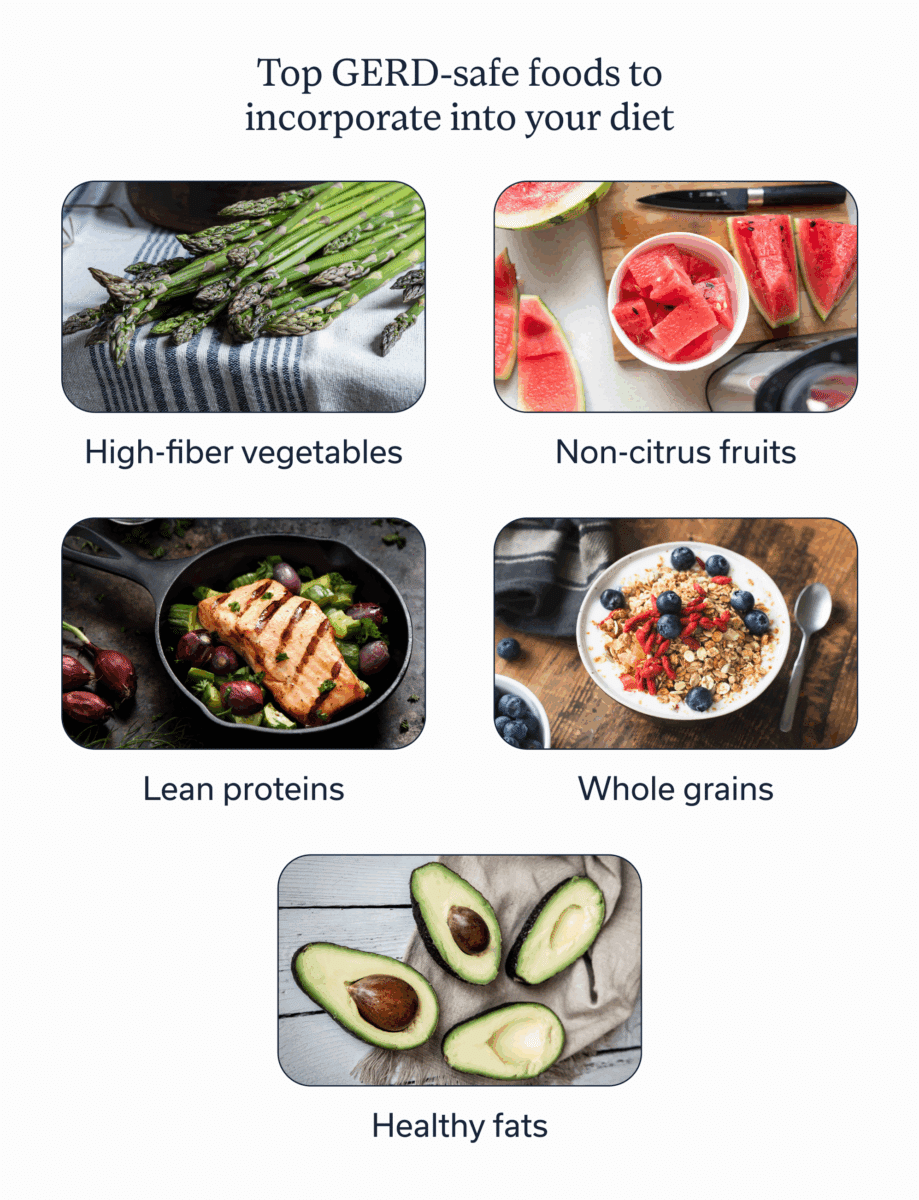
Lean proteins
Fat can slow down digestion and increases exposure to gastric juices, which may worsen GERD symptoms in some people. That’s why poultry, fish, eggs, and plant-based options are best for hitting your protein goals while managing reflux.
GERD-friendly proteins
-
Egg whites
-
Fish (white or low-fat)
-
Poultry (skinless)
-
Plant based options
-
Beans
-
Tofu
-
Lentils
-
Peas
-
Whole grains
Whole grains feature oodles of fiber to aid with digestion, and their consumption is associated with reduced incidence of GERD.
GERD-friendly whole grains
-
Brown rice
-
Oatmeal
-
Quinoa
-
Whole-grain bread
-
Whole-grain pasta
Healthy fats
Although some fatty foods may worsen GERD, your body needs healthy fats to function effectively. The following sources can boost your intake of polyunsaturated fats (PUFAs) while keeping GERD symptoms to a minimum.
GERD-friendly healthy fats
-
Avocados
-
Avocado oil
-
Nuts
-
Olives
-
Olive oil
-
Seeds
Lifestyle and eating habits to complement a GERD diet
While diet can be a helpful tool for preventing GERD symptoms, other lifestyle changes can also deliver relief. What works for you may be different than what works for someone else, but here are a few strategies to consider.
-
Eat at least three hours before lying down: Lying down too soon after a meal can cause reflux. Scheduling dinner at least three hours before bedtime may lessen the risk for symptoms, which could also impact sleep.
-
Sleep with your head elevated at night: You can use pillows or a specially designed wedge that goes under your mattress to create a natural rise to ease or prevent symptoms.
-
Eat smaller meals: Keeping your portions small (and eating more frequently throughout the day) may help to reduce stomach pressure that can exacerbate GERD symptoms.
-
Avoid tight-fitting clothing: Tight belts, waistbands, and other restrictive clothing can all contribute to GERD by increasing abdominal pressure , especially after a meal.
-
Avoid tobacco use: Tobacco can have a negative effect on saliva production. Saliva is rich in bicarbonate, which can help neutralize and clear acid. If you smoke, cessation will likely alleviate some of your GERD symptoms.
-
Understand how weight can impact symptoms: Having obesity is a risk factor for GERD. This is because obesity can impair the motility of food through the GI tract, cause dysfunction of the esophageal sphincter, and increase intragastric pressure. Obesity is a complex chronic condition that may require more than just lifestyle changes to treat. Working with an obesity medicine specialist may be helpful.
-
Work on your gut-brain connection: The brain and the gut are connected via what’s called the gut-brain axis. This means that stress, anxiety, depression, and more may also be a factor leading to worsened GERD symptoms. Working on your gut-brain connection with a GI psychologist can help you get rid of acid reflux.
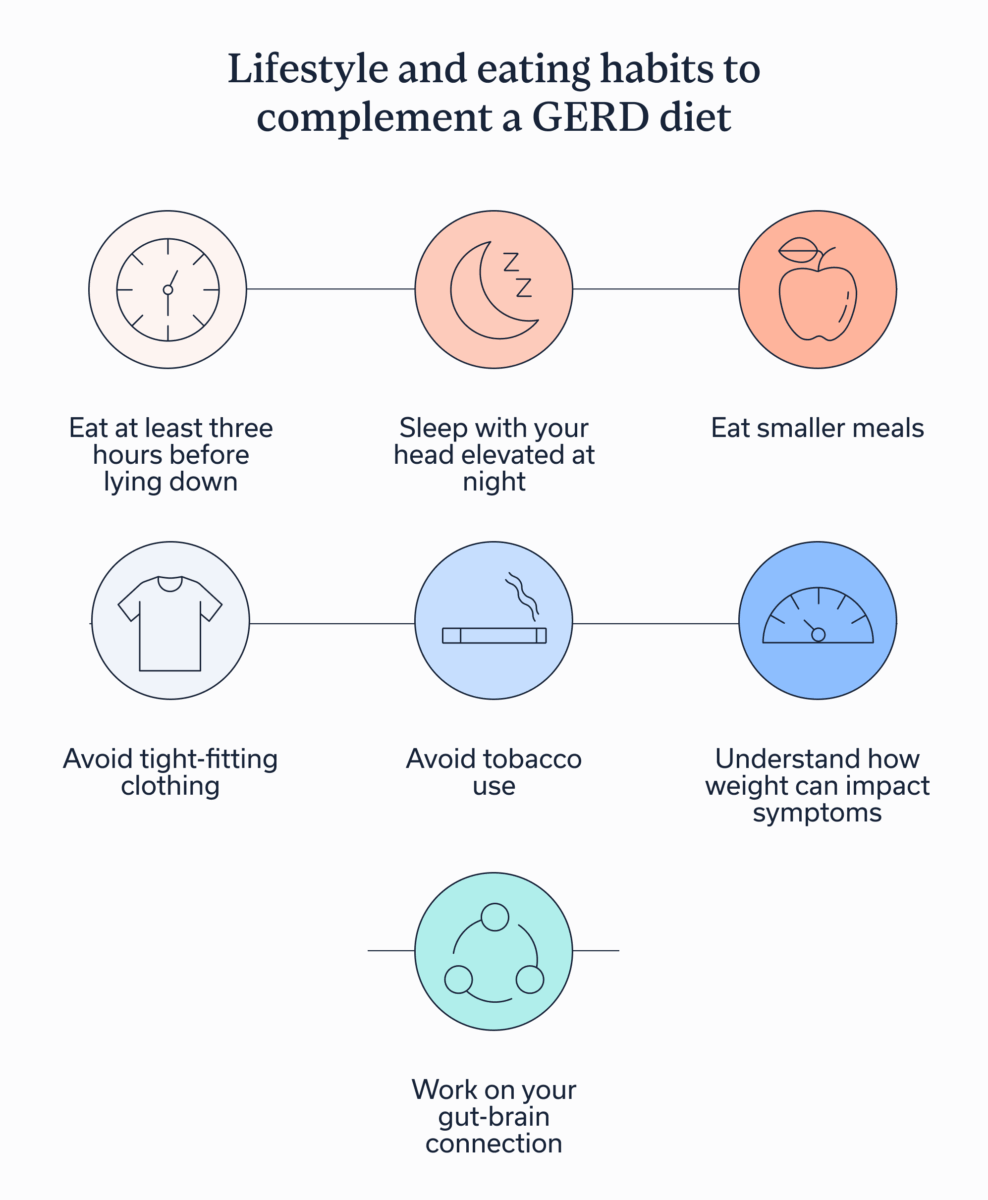
Foods to limit or avoid for GERD relief
As with GERD-safe foods, your GERD trigger foods will likely be different from other people’s. However some foods have landed themselves on a list of common symptom-causing culprits. These foods either relax the lower esophageal sphincter, increase stomach acid production, or slow digestion, with some causing a combination of these factors.
-
Alcohol: Alcohol can damage the stomach and esophageal lining, adding to worsened irritation. If you drink occasionally, limit your servings, allow plenty of time after consuming before lying down, and be mindful of which types of beverages tend to trigger GERD for you.
-
Alliums: Garlic and onions are in the alliums family. However, cooking them, rather than eating them raw, may be a solution to including these flavorful foods into your diet without triggering symptoms.
-
Carbonated beverages: Carbonation can cause bloating and pressure, which can worsen GERD symptoms.
-
Citrus and tomatoes: Citrus fruits and tomatoes are highly acidic, so sticking to other fruits may be best.
-
Chocolate: Chocolate has long been considered a GERD trigger, but you may be able to enjoy a small amount here and there without issue.
-
Coffee: Research is mixed on whether coffee ramps up GERD symptoms. If you know it’s a trigger for you, but you aren’t ready to give up your morning mug, you may find that cold brew or dewaxed coffee can be friendlier options due to lower acidity.
-
High-fat foods: Skip out on fried foods as much as possible, while leaning into healthy-fat options, such as nuts, seeds, and avocados.
-
Red sauces and condiments: Red sauces and condiments usually contain tomatoes, which contain citric acid. Skip these as much as possible if they are a trigger.
-
Salty foods: High-sodium foods are a notable GERD trigger, but if you like salt as a seasoning, you can experiment with sprinkling on a little during your food prep. Just be wary of ultra-processed foods, which tend to contain a lot of sodium.
-
Spicy foods: Spicy items typically contain the active compound capsaicin, which can irritate your esophageal lining, though research is mixed on whether these foods trigger GERD. You may need to experiment with the level of spice that is GERD-safe for you.
When to seek professional guidance?
If you experience frequent acid reflux, you may have GERD. And when GERD goes undiagnosed and untreated, it can lead to complications.
Acid is corrosive, meaning it can cause damage, so when stomach acid ends up in your esophagus, it can be problematic. In the long term, it can cause esophagitis, inflammation of your esophagus. It can also cause esophageal ulcers or stricture, which is when the esophagus becomes narrowed, leading to difficulty with swallowing.
Another concern with untreated GERD is the development of Barrett’s esophagus. This is when tissue that is like your intestinal lining replaces the tissue lining your esophagus. Barrett’s esophagus puts people at a higher risk for esophageal cancer.
Untreated GERD can also cause bronchospasms, commonly known as asthma attacks. GERD can worsen other lung conditions, such as chronic obstructive pulmonary disease (COPD), as well.
People with chronic GERD do have a small increased risk of developing esophageal cancer over time, according to the American Cancer Society. However, most people who have GERD do not develop esophageal cancer.
All of the above are reasons to get checked out by a knowledgeable clinician if you experience frequent bouts of acid reflux or feel that your diagnosed GERD needs a better management plan.
Managing GERD symptoms may include making changes to your diet and lifestyle. Working with a comprehensive GI team, like you’ll find at Oshi Health, can help. Oshi’s GI providers, registered dietitians, and gut-brain specialists can help you determine the best approach to treating and managing GERD. Your care plan may include medication, dietary or lifestyle changes, gut-brain support, and more, based on your unique circumstances.
Key takeaways
-
GERD is when acid reflux occurs regularly, resulting from malfunctioning of the lower esophageal sphincter, a valve that should prevent backflow of stomach contents.
-
Diet is a potential tool for managing GERD, but which foods are triggers and which are safe are highly individual.
-
However, some common GERD-safe foods include high-fiber veggies, non-acidic fruits, health sources of fat, and lean sources of protein.
-
A GI registered dietitian, such as those at Oshi Health, can help you find relief with tailored dietary support.
FAQ
-
Common GERD-trigger foods include alcohol, carbonated beverages, chocolate, citrus, coffee, garlic, onion, red sauces or condiments, and fried, high-fat, salty, and spicy foods.
-
Although everyone’s experience of GERD is a little different, experts generally recommend these GERD-safe foods: high-fiber veggies, non-acidic fruits, healthy sources of fat, and lean sources of protein.
-
Some typically GERD-safe breakfast foods include oatmeal, egg whites, whole-grain toast, avocado, and non-citrus fruits.
-
If you have a GERD diagnosis or are experiencing frequent episodes of acid reflux, talk to a knowledgeable clinician. They can help develop a treatment plan to help you feel better.
-
No foods can completely neutralize stomach acid immediately. Instead, taking an over-the-counter antacid can often provide fast relief.
Oshi is your partner in digestive health
Feel like your digestive concerns are running your life? You’re not alone—and we’re here to help you find lasting relief.
Oshi Health GI providers, gut-brain specialists, and registered dietitians work together to address your symptoms and find solutions that actually work for you.
Whether you’re dealing with chronic digestive issues or unpredictable symptom flare-ups, our GI specialists deliver:
✔ Personalized care plans tailored to your lifestyle
✔ Science-backed strategies to calm your gut
✔ Compassionate, whole-person care
✔ And so much more!
Ready to take control of your gut health?



